
The annual 3-steps-1-bow practice on the eve of vesak is once again upon us. This year, it will be conducted on 31 May 2015, with 20k ~ 30k Buddhists participating in the 2.5 hours long round-the-monastery spiritual practice.
Yearly, Kong Meng San Phor Kark See Monastery also issue free queue tickets for participants so that the monastery is able to cater to everyone’s participation from 6pm to 7am in the morning.
This year’s ticket for the practice will be issued on Sunday 24 May 2015 at 9am.
Those without the ticket may join the open queue which usually starts around 10+pm.
http://www.kmspks.org/news/distribution-of-3-steps-1-bow-tickets-free/
What is this 3-steps-1-bow practice about?
The practice itself involves doing a prostration followed by taking 3 steps. This completes a set. Together with thousands of fellow participants, one perform each set mindfully, in unison with each other and in line with the inspiring background chant of the verse “Namo benshi shijiamunifo” 南無本師釋迦牟尼佛.
The verse itself means
南無 Homage, Refuge 本師 to our root teacher 釋迦牟尼 the enlightened sage of the Sakya clan, 佛 the Buddha
In our life, we have many responsibilities, duties and pursuits. While they may appear trivial to others, they are important to us. Let us not ignore or deny that. But for 2.5 hours, during this practice, we learn to put all these aside, both the trivial and important. Not to escape, but to devote some time inwards. To be mindful inwards, towards our body, speech and mind.
We put aside our daily pursuit for self-gratification, running after pleasure and away from discomfort. We observe and learn about our body and mind, our strengths and our limits. Ah, how the body can give rise to pleasure, but under the right conditions, it can also give rise to a spectrum of different experiences such as aches, soreness and pain. We learn to face and embrace the body the way it is.
We also learn to see how our mind is stronger than we think we are. We have more resilience than we realise. That the mind can indeed triumph the body.
It is not the most relaxing or easy thing to do, to be honest. But we learn to see how we do not always need the air-con to cool our mind. That even as we perspire and experience heat and fatigue in the body, we can be tranquil in our mind. As the Chan Buddhist saying goes “心静自然凉” “One is cool when the mind is quiet (and calm)”.
Mindfully, we take each step. Mindfully, we prostrate. Sincerely we purify our body, speech and mind.
Join us for this year’s 3-step-1-bow this year. Let’s start the journey. The way to Buddhahood is going to be tough, strenuous and arduous. But it would be all worth the while. And when you look around, fellow Bodhisattvas are there, with us along the way.
See you then!





